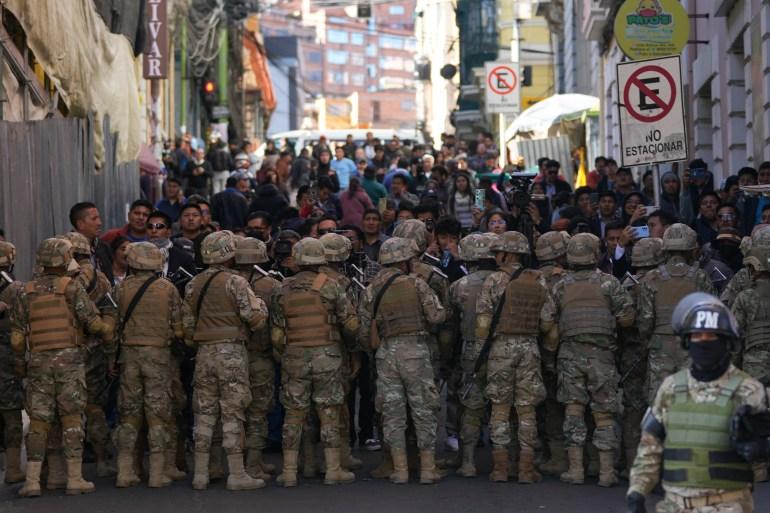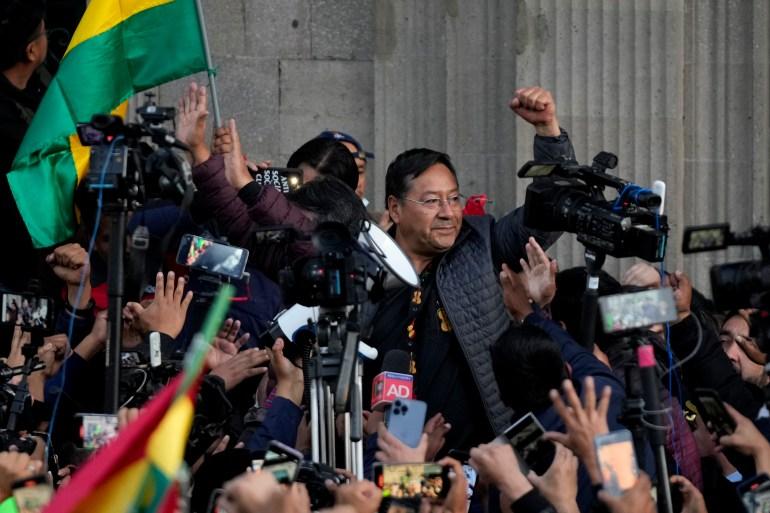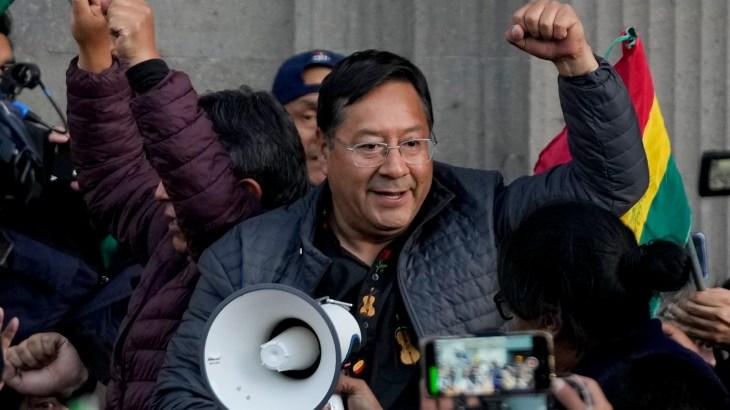Bolivian President Luis Arce successfully prevented a military coup orchestrated by Army General Juan Jose Zuniga, who was apprehended after attempting to seize control.
Who is Luis Arce?
 Military police block entry to Plaza Murillo in La Paz, Bolivia
Military police block entry to Plaza Murillo in La Paz, Bolivia
- Luis Arce, aged 60, assumed office as Bolivia's president in November 2020.
- Arce's election followed a period of political unrest triggered by the resignation of long-time President Evo Morales in 2019. The interim presidency of then-senator Jeanine Anez ensued, who later faced imprisonment for instigating a coup that brought her to power.
- Initially an economist, Arce devised Morales's economic strategy during his presidential campaign in 2005 and was appointed Minister of Economy in 2006.
- Tensions between Arce and Morales have escalated in recent times, with both leading factions within the dominant MAS political party. Despite a Constitutional Court ruling barring Morales from running, he intends to compete against Arce in the 2025 elections.
- Arce's presidency in 2020 marked a return to stability in Bolivia; however, challenges persist, including a scarcity of US dollars and ongoing economic issues.
Why was there an attempted coup in Bolivia?
 Bolivian President Luis Arce raises a clenched fist surrounded by supporters and media, outside the government palace in La Paz, Bolivia
Bolivian President Luis Arce raises a clenched fist surrounded by supporters and media, outside the government palace in La Paz, Bolivia
- General Zuniga alleged that Arce's administration was causing economic hardship in the country.
- Arce has grappled with economic challenges, including a shortage of US dollars, diminishing foreign reserves, and an escalating fiscal deficit. Additionally, the economic strain has worsened due to increased oil subsidies following global events such as the Ukraine conflict.
- Bolivia's economy heavily relies on mineral exports, and declining commodity prices have exacerbated its financial situation. The country experienced a revenue boost in 2014 due to a surge in commodity prices, especially for minerals like lithium. However, the COVID-19 pandemic severely impacted its economy.
- The nation has a history of political instability, high income inequality, and severe poverty, particularly among Indigenous groups. Morales's tenure witnessed political stability and significant poverty reduction.
- The current economic outlook for Bolivia is challenging, with the IMF forecasting minimal growth at 1.6%.
- Zuniga justified the coup attempt as a move to "restore democracy" and free political detainees, emphasizing the need for a democratic system not dominated by a select few for prolonged periods. The MAS party has governed Bolivia since Morales assumed office in 2005 as its first Indigenous president.
- Arce's leadership has faced opposition, with right-wing factions staging protests, notably in Santa Cruz, against governmental decisions.
How did the attempted coup unfold?
- Armed troops entered Plaza Murillo in La Paz, a significant square housing governmental institutions, on a Wednesday afternoon.
- One of the tanks attempted to breach the entrance gate to the plaza.
- The coup endeavor lasted roughly five hours.
- Visual footage captured a tense confrontation between Arce and Zuniga, surrounded by soldiers.
How was the coup averted?
- Arce intervened by ordering Zuniga to withdraw his forces, preventing further escalation.
- The troops retreated from the plaza, and Zuniga was detained by the police.
- Arce expressed gratitude to the Bolivian citizens for their support and emphasized the importance of upholding democracy.
How did Bolivian leaders and people respond?
- The failed coup received widespread international condemnation, with solidarity from the Bolivian populace aiding in its prevention. Demonstrations against the coup were witnessed in Bolivia.
- Morales denounced the military's actions, affirming the protection of democracy and citizen rights.
What happened to General Juan Jose Zuniga?
- Deputy Interior Minister Jhonny Aguilera arrested Zuniga, notifying him of criminal charges under various penal code articles related to armed uprisings and attacks on state sovereignty.
- Zuniga, who had held significant military positions, including being appointed by Arce in 2022, faced further legal consequences for his involvement in the coup attempt.
- Juan Arnez Salvador, another high-ranking military official and navy head, was also apprehended.
How did the international community react?
- The coup attempt drew international condemnation, with world leaders emphasizing the illegality of the military's actions.
- Various heads of state, including those from Chile, Ecuador, Mexico, and Brazil, denounced the coup and advocated for democracy's preservation.
- The Organization of American States (OAS) reiterated its commitment to upholding constitutional order in Bolivia.
Bolivia's history of coups
- Despite South America's historical coup instances, Bolivia reigns supreme with numerous coup efforts since the 1950s.
- The resignation of Morales in 2019 was considered a coup by the MAS party, highlighting the nation's tumultuous political past.

 Military police block entry to Plaza Murillo in La Paz, Bolivia
Military police block entry to Plaza Murillo in La Paz, Bolivia
 Bolivian President Luis Arce raises a clenched fist surrounded by supporters and media, outside the government palace in La Paz, Bolivia
Bolivian President Luis Arce raises a clenched fist surrounded by supporters and media, outside the government palace in La Paz, Bolivia